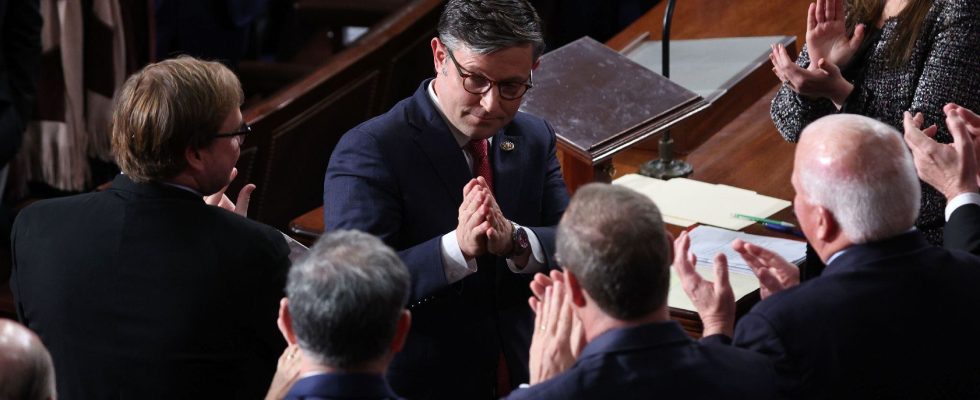This is the last chance bill in the United States. The Republican Party unveiled on Saturday November 11 a temporary and rather unusual plan to finance the federal state, threatened with a possible budgetary paralysis within a week: the famous “shutdown”.
For two months, neither the Senate, controlled by Democrats, nor the House of Representatives, controlled by Republicans, have managed to adopt a law to extend the American federal budget. They have until Friday, November 17 to reach an agreement, otherwise all federal administrative services will come to a grinding halt. An extremely unpopular situation that this new two-step plan wishes to avoid… But which risks not pleasing any camp.
Split funding for federal agencies in two
This two-part plan is “a necessary text to put House Republicans in the best possible position to defend conservative victories,” said Republican Mike Johnson, the new speaker of the House of Representatives. Concretely, this solution plans to finance certain American federal agencies for longer than others.
According to the American television channel CNN, a first bill would aim to keep certain federal services open in the short term, until January 19, 2024. This would include “funding for military construction, veterans affairs, transportation, housing and the Department of Energy”. The rest of the federal government’s budget would be financed by a second, slightly longer-term bill, until February 2. In particular the ministries of “Justice, Commerce, Labor, Health and Social Services”, details the American daily Washington Post.
This would allow the Republican majority in Congress to buy time and avoid having to accept or reject a single plan that contains financing measures that they do not approve of. The two American parties disagree in particular on funding for Israel, Ukraine and border security. Thus, “neither of the two bills” announced on Saturday by the Republicans provides for this type of funding, reports CNN. “The bill will end the absurd holiday season tradition of introducing massive, jam-packed spending bills just before the Christmas holidays,” writes Mike Johnson on the social network.
A solution that may not please anyone
This proposal, however, risks being received freshly in Congress. On the side of the White House, the spokesperson for the Democratic presidency described it as “a recipe for more Republican chaos and more shutdowns”. Even a Republican vote is not certain, given the political confusion of recent months. At the end of September, the latest negotiations on the American federal budget had caused the division of the opposition: Trumpist elected officials, furious that the leader of their party in the House of Representatives had reached a last minute agreement with the Democrats, had dismissed.
This unprecedented situation in the United States caused a three-week wait before electing the current Republican leader at the head of the House, Mike Johnson. By presenting this unusual two-part plan to Congress, Mike Johnson is therefore playing on his legitimacy and will have to deal with a very demanding Republican majority. Some members of his camp are already complaining that this strategy does not provide the funding cuts they seek, like the elected Texan Chip Roy on Xreports the Washington Post.
However, time is running out: Congress has until midnight, on the night of Friday to Saturday, November 18, to find common ground and prevent the world’s largest economy from suddenly slowing down. Beyond provoking the anger of the 1.5 million civil servants deprived of salaries, a repeated shutdown of federal administrative services risks costing the country dearly: at the end of 2018, a month of shutdown had reduced the GDP of the United States by more than 3 billion dollars.
